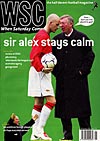 Joyce Woolridge wades through yet another book allegedly written by George Best and finds it more honest than the previous ones, but no less depressing
Joyce Woolridge wades through yet another book allegedly written by George Best and finds it more honest than the previous ones, but no less depressing
Blessed is George Best’s fourth autobiography. He has also been the subject of at least two other major biographies and a film. Aside from Billy Wright, he is probably the most prolific producer of various versions of his life story. Potential readers of what might be Best’s last book, given his increasingly fragile health, might ask if there is anything else to be said about his brilliant football career and spectacular fall from grace. Blessed, though full of much familiar material, is sufficiently different from what has gone before to be of interest.
Since Eddie Hapgood’s Football Ambassador (1945), the first book-length life of a professional footballer, the largely working-class football fraternity have seen autobiographies as a means to assert pride in themselves and their profession. Most have thus been exemplary lives, in which the young player serves an apprenticeship, trains hard, takes the knocks and learns humility, before enjoying his rewards. In the 1970s, two other types of autobiography emerged: the confessional and the exposé. Best made his contribution to the development of both and the differences between his various efforts are highly revealing.
His first foray came with The Best Of Both Worlds (1968), a slim potboiler which, though prepared to reveal that our gorgeous young Irishman had “an eye for the ladies”, stretches credulity to its utmost by claiming that the tanned, slim blonde he met on the train back from the European Cup final was dropped off at a hotel by her chivalrous swain and picked up again for breakfast. Best also admitted to “one or two problems” with late nights, but they were all sorted out by the avuncular Matt Busby. Never again could George plead such innocence. His later lives are permeated by sticky carpeted pubs, stained sheets and broken promises.
Michael Parkinson’s Best: An intimate biography (1975), with its sneering, denunciatory commentary punctuating what are obviously extracts from a drunken interview, casts him as a foul-mouthed misogynist, his mind fixated on the next drink and a “quick fuck” with the willing tarts who constantly offered themselves to him. Parkinson’s purpose (aside from profit) was to expose the decline of authentic working-class culture and its replacement by the shallow world of consumerism and shabby celebrity. What he actually did was to knock off whatever lustre still clung to the golden boy, and Best has spent some time since then rebutting the unpleasant figure he cuts in its pages.
Following Jimmy Greaves’s frank confession of his alcoholism in This One’s On Me, Best’s Eighties autobiography Where Do I Go From Here? ends with him in rehab, embracing (briefly) the AA programme, admitting his alcoholism after his extended lost weekend in California, awaiting the birth of his son Calum, and the hope of recovery. It’s not just hindsight that tells you that this is a forlorn hope. This book and the 1990 “men behaving badly” opus, The Good, the Bad and the Bubbly, in different ways still defend the boozy lifestyle which ended his career prematurely and try to justify his disastrous move to American soccer.
Blessed is unique in George Best’s many lives, in that, with its older man’s perspective, there are fewer excuses. It is altogether a more wistful, intelligent and ultimately elegiac version. For once, he doesn’t entirely blame his increasing disillusion with football on Busby and his successors’ failure to strengthen the Manchester United team, and recognises that he was part of United’s problems rather than merely its victim. He admits instead that he was drinking too much to turn up to training, and that booze was more important than the game.
Some of the more frequently repeated hellraising anecdotes, including the famous “where did all go wrong?” hotel porter’s tale, are absent, as are the tawdry headboard tallies of past conquests. Whether this is because the older Best now finds these undignified, or omits them out of deference to his “young wife” Alex, is unclear. Best the gigolo has now been replaced by someone who worries that she will find a younger man, a supreme irony given his previous form.
But, inevitably, George Best’s autobiography will always have more to do with his alcohol addiction than his talent, which for football fans is the ultimate sorrow. For those of us lucky enough to have seen his incandescent play live, it will always be a privilege, but the book is much more successful in evoking the degradation and evasions of the alcoholic than the glories of the football field. We can presume this is how Best wants to be remembered and he claims to have actively written much of it. True to the model of the exemplary life, the final sentence states: “When I look back at my life it is impossible not for me to feel blessed.” But he has undeniably paid a high price for his talent.
From WSC 179 January 2002. What was happening this month